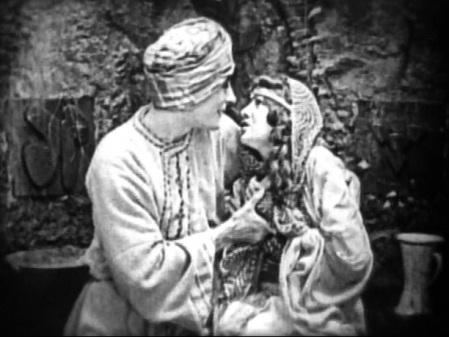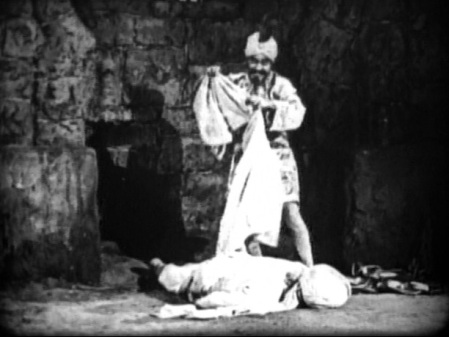A beggar, a caliph and a bandit find themselves enmeshed in a very strange adventure. Secret romances, revenge and murder all play a part. With a scruffy protagonist and the love story pushed to the background, you can think of this as the un-Sheik of silent films.
Home Media Availability: Released on DVD.
Take my hand…
Kismet is most famous as a musical but it didn’t actually become one until four decades after its premiere. The original play opened in London in 1911 and was adapted for the screen for the first time in 1914. There were non-musical remakes in 1920, 1930 and 1944.
The ’44 version was in opulent color, starred silent veterans Marlene Dietrich and Ronald Colman and was directed by William (Wilhelm) Dieterle, Paul Leni’s protege. In 1953, the story was adapted into a musical by Robert Wright and George Forrest, which was then adapted for film once again in 1955 as a vehicle for Howard Keel.
This is the second filmed version of Kismet and it stars Otis Skinner, who was the leading man of the original New York production. Can the story stand on its own or does it require purloined tunes from Russia to succeed? Let’s find out!
To be honest, I didn’t have high hopes for this film. Stage stars would more often than not crash and burn in the silents, their sweeping gestures ridiculous on the silver screen.
Another cause for concern: The movie’s distribution company was a rather obscure one, Robertson-Cole. But wait, there is a story to be told here! The Robertson-Cole Distributing Corporation was reorganized into the Film Booking Offices of America (FBO), which was then purchased by Joseph P. Kennedy (yes, father of John and Robert Kennedy). RCA bought control of FBO in 1928 and combined it with the Keith-Albee-Orpheum theater circuit to form the Radio-Keith-Orpheum Corporation or what we know as RKO, which was eventually purchased by Howard Hughes…
Whew! My point, before the tangent, is that these sorts of films can go very bad very quickly and I was a little bit wary when the movie began.
Kismet is the story of Hajj (Otis Skinner), a beggar who asks for alms outside a mosque in Bagdad. Years ago, his enemy, Jawan (Herschel Mayall), stole his wife and murdered his son. Well, Jawan has returned to Bagdad in search of his own son, who was kidnapped by the old Caliph years before. Hajj vows to get his revenge.
Meanwhile, the young new caliph, Abdullah (Leon Bary), has been going over the books and it seems that one of his viziers, Mansur (Hamilton Revelle), has been skimming cash and generally acting the villain. Abdullah decides to investigate and remove him from power. But first, he has an appointment to keep. In spite of his rank, Abdullah has been regularly walking the streets of Bagdad in the clothes of a commoner. Why? Well, he says it’s to get to know the people but he has a much more personal reason.
Hajj’s daughter, Marsinah (Elinor Fair), has been secretly receiving Abdullah’s courtship. She believes he is merely a gardener. Abdullah is utterly smitten and has decided to pop the question.
Meanwhile, Hajj has disguised himself as a wealthy man but before he can set about his revenge, he is seized and accused to being a conman. It’s a fair cop but Hajj gets let off the hook. You see, the case was brought before Mansur, the corrupt vizier mentioned earlier, and he promises to spare Hajj’s life and marry Marsinah if Hajj will kill the Caliph.
That goes about as well you as you might expect. Abdullah is no dummy and he is wearing a coat of mail under his clothing. Hajj’s dagger doesn’t even scratch him. So, it’s house arrest for Mansur and the dungeon for Hajj. Jawan has also been arrested for his earlier misdeeds. While in stir, Hajj takes the opportunity to kill his enemy and then uses his identity to escape.
A problem! Marsinah has already been delivered to Mansur’s home. Can Hajj and Abdullah save her? The suspense is just killing me.
Kismet definitely plays into the oriental fantasy genre that was so popular. For what it’s worth, the movie is absolutely gorgeous. The sets are beautiful confections, stylized and sweeping.
Later versions of Kismet would either eliminate the revenge aspect of the story (1944) or keep the vengeance but remove it from the protagonist’s motivation (1955). The 1920 version, on the other hand, is quite ruthless in its approach. I actually prefer it to the smoothed-down sound versions. Hajj is such a deeply flawed character that he elevates the entire story.
This movie’s biggest challenge is overcoming the opening title and the legacy of both The Sheik and subsequent adaptations of Kismet iteself. You see, the leading man, Otis Skinner, is introduced in the opening credits as “America’s foremost romantic actor.” Talk about setting the bar high! This is also problematic as I would describe the character of Hajj as more comedic than romantic.
Otis Skinner was born in 1858, which made him 62 years old when his version of Kismet was released (he also starred in the 1930 talkie remake). Ronald Colman was 53 when he played the Hajj character and Howard Keel was just 36 when the musical version was made. Our protagonist just keeps getting younger and handsomer! Since these last two versions are by far the most famous, the sight of the raggedy Otis Skinner may be a bit off-putting to modern viewers.
Further, I think we are conditioned (thanks to films like The Sheik and Son of the Sheik plus numerous ripoffs) to view silent Arabian Nights-style films as lusty bodice-rippers when Kismet is actually a dramatic revenge tale with some comedic elements. (I should point out that The Sheik lifts shots and title cards from Kismet and rather blatantly, too.)
I actually really enjoyed Skinner in the lead role. Hajj is cowardly and dishonest but he also has an understandable motivation for vengeance and he is, if nothing else, a good father. Skinner’s portrayal is nicely layered with the gears in his head constantly whirring, looking for a new opportunity. He does overact a bit but then Hajj is a bit of a drama king himself. I describe the character as the protagonist and not the hero because Hajj tends to skate the line between. The scene that best captures Hajj’s character, I think, is the one where our protagonist tricks, stabs and drowns Mansur (who was threatening Marsinah). As his enemy glubs his last, Hajj lies on his stomach and watches, his legs swaying with childlike glee. It’s sick, it’s funny and it perfectly encapsulates what Hajj is all about.
It’s a good thing that Mr. Skinner is so charming because he is basically the whole show.
Elinor Fair (just shy of seventeen when the film was made) plays Hajj’s daughter, who is as naive as her father is wily. Fair is lovely but quite raw and she doesn’t show the confidence she would later display under the DeMille banner.
Rosemary Theby, who plays Kut-al-Kulub, gets the award for most overblown performance. Her arms flail and her eyes roll and she is just completely over the top. As Mansur, Hamilton Revelle glowers and grimaces but never comes off as particularly menacing. At forty, Leon Bary is a little old to be playing the callow new caliph and especially too old to be romancing the very young Miss Fair. I would classify this as the biggest miscasting.
The whole story ends with Hajj vowing to undertake a, well, hajj to Mecca. (Hajji would be the more correct form for use as a title.)
As far as the musical version of the tale is concerned, all I shall say is that director Vincente Minnelli and I see exactly eye to eye. He only agreed to direct the movie adaptation because he was promised a high budget and creative freedom for his dream project, Lust for Life, in exchange. (You can get the skinny on the deal in Vincente Minnelli: Hollywood’s Dark Dreamer by Emanuel Levy.)
The musical’s, well, music was not original. The songs were adapted from the classical works of Alexander Borodin. Borodin was one of the most fascinating and likable men in the classical music scene. Illegitimate son of a Georgian prince, chemist, feminist, cat rescuer and brilliant composer. If you love the musical Kismet, I beg you to listen to Borodin in the raw, without the Broadway sound gunking up his brilliantly emotional pieces.
This version of Kismet, while not perfect, moves along briskly and features a fun performance from Otis Skinner. Don’t come in expecting The Sheik as this movie is in a totally different style but I think there is plenty to amuse fans of the Arabian Nights fantasy.
I was pleasantly surprised by how much I enjoyed the film and I am glad to recommend it.
Movies Silently’s Score: ★★★
Availability
Kismet is available on DVD-R from Grapevine Video.
☙❦❧
Like what you’re reading? Please consider sponsoring me on Patreon. All patrons will get early previews of upcoming features, exclusive polls and other goodies.
Disclosure: Some links included in this post may be affiliate links to products sold by Amazon and as an Amazon Associate I earn from qualifying purchases.













